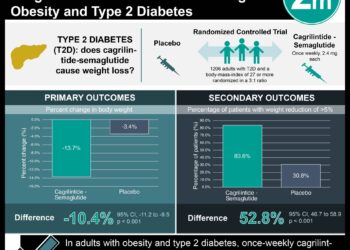Brain injection of peptide could induce sustained diabetes remission [PreClinical]
1. In multiple rodent models of type 2 diabetes, central injection of fibroblast growth factor 1 (FGF1) normalized blood glucose levels over multiple weeks.
2. The FGF1 mechanism of action involved the activation of cells lining the third ventricle of the brain, as well as the induction of an increase in liver and skeletal muscle glucose uptake.
Evidence Rating Level: 1 (Excellent)
Study Rundown: Despite advancements in treatment for type 2 diabetes, the only current option for sustained hyperglycemia remission is surgical intervention. However, previous studies have identified FGF receptors in the brain as potential targets to induce long-term remission. This study investigated FGF1, the only protein in its family known to activate all FGF receptors without the need for a co-receptor.
First, a genetic mouse model of type 2 diabetes was used to determine the effect of centrally injecting mouse FGF1 on fasting blood glucose levels. Without any changes in diet or weight, this treatment led to sustained normalized blood glucose levels for over 17 weeks. This treatment was then tested in alternative mouse models of both genetic and diet-induced type 2 diabetes, as well as a rat model of diabetes, and similar results were obtained.
Finally, the researchers determined the mechanism through which FGF1 induced a sustained normoglycemic state. Although there were no significant changes in the insulin levels of mice that received FGF1, they had a significantly increased glucose clearance rates in the liver and skeletal muscle. Further, there was an increase in expression of hepatic enzymes involved in glycolysis and glycogen synthesis. In addition, tanycytes, epithelial cells that line the third ventricle, were activated upon FGF1 administration, illustrating a potential role of these cells in regulating glucose levels in diabetic patients.
This study showed that FGF1 could be a new breakthrough treatment to induce sustained normal glucose levels in diabetic patients without surgical intervention. To improve clinical applicability, future work could investigate intranasal delivery of FGF1 to the central nervous system.
Click to read the study in Nature Medicine
Relevant Reading: Endocrinization of FGF1 produces a neomorphic and potent insulin sensitizer
In-Depth [animal study]: The effect of FGF1 on fasting blood glucose levels was tested in multiple rodent models of type 2 diabetes: mice with a genetic deficiency of leptin, mice with a genetic deficiency of the leptin receptor, mice with diet-induced obesity, mice with insulin resistance and pancreatic beta cell dysfunction, and rats with leptin receptor deficiency. After one injection of 3 µg of FGF1 into the lateral ventricle of these animal models, blood glucose levels were significantly decreased compared to vehicle treatment over multiple weeks (p<0.01). These results were independent of dietary or weight changes, and treatment did not induce hypoglycemia in any of the animal models.
Using the mouse model with leptin genetic deficiency, the researchers then determined the mechanism through which these changes occurred. Changes in insulin sensitivity, insulin secretion, and glucose disposal were measured using a frequently sampled intravenous glucose tolerance test along with a minimal-model analysis. Although no changes in insulin production or response were observed, there was an increase in glycogen stores in the liver as well as levels of glucoregulatory enzymes such as pyruvate kinase, glucokinase, and glycogen synthase 2 (p<0.052). In addition to the liver, skeletal muscle also showed an increased glucose clearance rate.
Finally, the central effect of FGF1 injection was evaluated by analyzing tanycytes. Upon FGF1 administration, these cells were activated and showed an increased expression of heat shock protein 1. In addition, FGF1 induced an increase in synaptic density within the hypothalamus of these rodents (p< 0.05).
Image: PD
©2016 2 Minute Medicine, Inc. All rights reserved. No works may be reproduced without expressed written consent from 2 Minute Medicine, Inc. Inquire about licensing here. No article should be construed as medical advice and is not intended as such by the authors or by 2 Minute Medicine, Inc.








